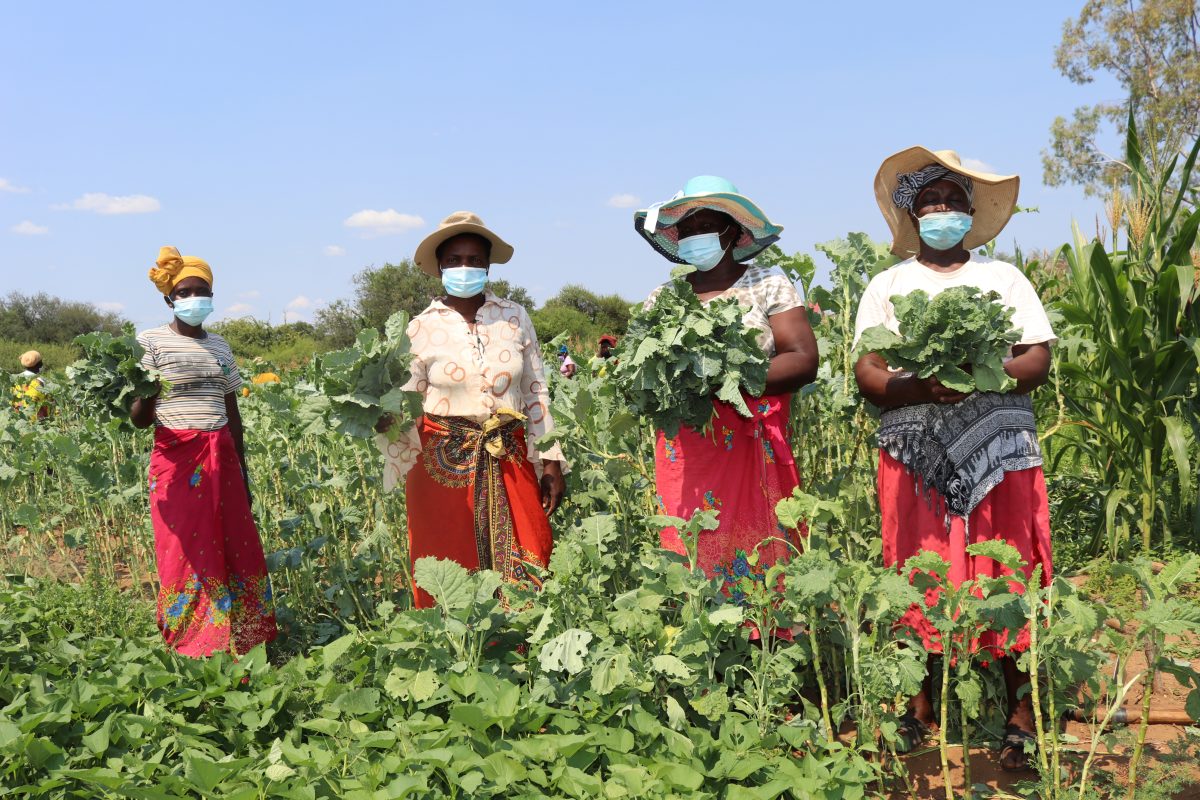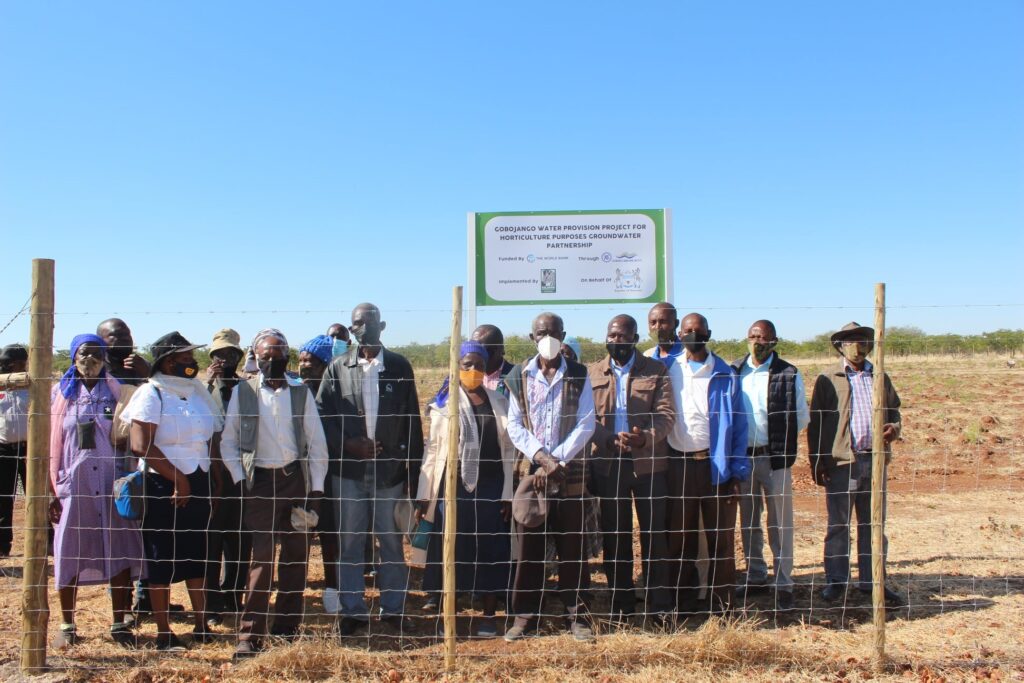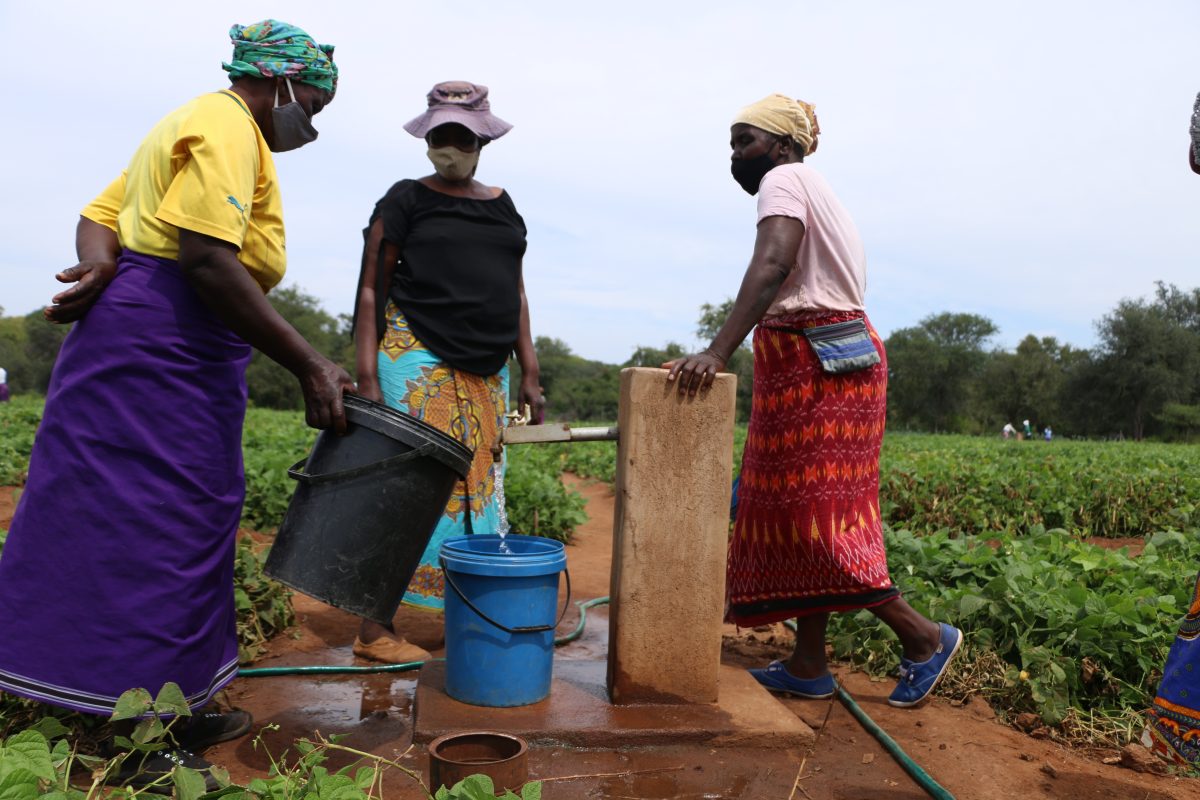Providing Water for Food Security to Local Communities in Botswana and Zimbabwe
Posted in : Latest on 21 March 2022
“Making groundwater accessible and visible to the people”

Women from Maitazwitoma community garden showing off Covo from their rehabilitated garden.
Fresh produce is used to feed families and generate income from the surplus. Photo Credits: SADC-GMI
Sustainable Groundwater Development for water and food security is extremely important for the SADC region to mitigate against the worsening impacts of climate change. Consequently, the Southern African Development Community Groundwater Management Institute (SADC-GMI) endeavours to implement projects that are transformative and life-changing to the communities on the ground. This has been evident in many projects the SADC–GMI implemented in the SADC region, including the water supply pilot projects implemented in Botswana (Gobojango and Tsetsebjwe) and Zimbabwe (Dite and Whunga) villages.
The projects were first implemented in 2007 and 2011 as part of the Groundwater and Drought Management project in SADC funded by the Global environment Facility (GEF). After an assessment conducted by SADC-GMI in 2018, it was discovered that the projects were not operational and the infrastructure in both countries (Botswana and Zimbabwe) required rehabilitation with various reasons being cited for the dysfunctionnality.
Recognizing the significant role of groundwater across the region where at least 11 million people are facing critical food shortages due to the drought caused by climate change, SADC-GMI has implemented several interventions to assist communities to access safe water for domestic and agricultural use. In the last 3 years, 10 SADC Member States benefitted from the interventions supported by the SADC-GMI through the sub-Grant scheme which was part of the Sustainable Groundwater Management in SADC Member States Project. The project was funded by the Global Environment Facility (GEF) and the Cooperation in International Waters in Africa (CIWA) through World Bank support. It was another endeavour by SADC-GMI of addressing water challenges in the SADC region and ensuring that communities had access to clean and safe water for improved livelihoods.
The overarching objective of these projects was to rehabilitate the community groundwater projects and ensure that the households have access to water for domestic and livelihood activities especially during droughts. The projects also aimed to provide sustainable groundwater supply for horticultural purposes in the pilot sites through alternative and sustainable interventions, as a climate change mitigation measure.
In 2018, SADC-GMI rehabilitated community projects in Dite and Whunga communities within the Limpopo River Basin in Zimbabwe. Dite and Whunga are situated close to Beitbridge, a dry area with extremely elevated temperatures mounting to 40 degrees Celsius. For the past years, the Dite and Whunga community experienced acute water challenges which negatively impacted their livelihoods as they could not continue with their subsistence farming and other domestic chores that required sustainable water supply.
Both Dite and Whunga had old water infrastructure, namely a borehole in Dite and a Sand Dam in Whunga which were built during the 2007-2011 project. The SADC-GMI project team assessed the infrastructure to determine if it could still provide water to the community and the findings revealed that the infrastructure was dysfunctional and required rehabilitation. The rehabilitation of these project sites directly transformed the lives of more than a thousand men, women and children from the two communities who are now able to access a reliable water supply for their domestic and economic livelihoods despite the variable rainfall currently experienced in the region.

Community from Gobojango and Government Officials at the project site during the project commissioning:
Photo Credits: SADC-GMI
In Botswana, a total of 7094 community members benefited from the community gardening project, (2246 Gobajango and 4848 Tsetsebjwe respectively). The water supply and community gardens that were rehabilitated as part of the project drastically improved their water and food security. The project also improved livelihoods as communities can now access potable water to sustain their subsistence farming and sell fresh produce from the horticultural gardens to the local market, which helps them generate income. The project also shortened the distance that women and young girls had to walk to access fresh water. Now women and young girls can focus on other productive activities such domestic chores and schoolwork.
Stakeholder engagement consultations were conducted with the community prior to the rehabilitation to establish the requirements of each project site and to ensure that communities have input in the project implementation and take ownership post the project implementation. The communities were also capacitated on maintenance issues to ensure that they can look after the infrastructure.
These interventions supported the Sustainable Development Goals as promulgated by the United Nations, especially goal 6 “Ensure availability and sustainable management of water and sanitation for all”, Goal 1 “End poverty in all its forms everywhere”, and Goal 3 “End hunger, achieve food security and improved nutrition and promote sustainable agriculture.
“SADC-GMI’s core mandate is to promote sustainable groundwater management and provide solutions to groundwater challenges across the SADC region, and we are glad that we were able to collaborate with the governments of Botswana and Zimbabwe to successfully implement these community projects to make groundwater accessible and visible to the people. Through the projects, water and food security was drastically improved.

Water point close to the gardening scheme, at Whunga to ensure easy access to water all the time. Behind the women are the green gardens irrigated using groundwater from the borehole
Photo credit: SADC-GMI


